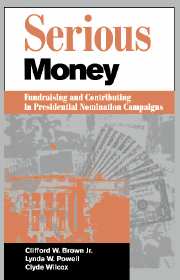Book contents
- Frontmatter
- Contents
- List of figures and tables
- Acknowledgments
- 1 Introduction
- 2 The regulatory environment
- 3 The contributor pool
- 4 Mobilizing the pool: Methods of soliciting campaign funds
- 5 Candidate resources
- 6 Recruiting contributors and solicitors: Candidate and individual decisions
- 7 Conclusion
- Appendix I The 1988 and 1992 presidential nomination surveys
- Appendix II 1988 and 1992 survey items used in the analysis
- Notes
- Bibliography
- Index
2 - The regulatory environment
Published online by Cambridge University Press: 27 August 2009
- Frontmatter
- Contents
- List of figures and tables
- Acknowledgments
- 1 Introduction
- 2 The regulatory environment
- 3 The contributor pool
- 4 Mobilizing the pool: Methods of soliciting campaign funds
- 5 Candidate resources
- 6 Recruiting contributors and solicitors: Candidate and individual decisions
- 7 Conclusion
- Appendix I The 1988 and 1992 presidential nomination surveys
- Appendix II 1988 and 1992 survey items used in the analysis
- Notes
- Bibliography
- Index
Summary
The strategic calculations of political campaigns logically begin with the rules of play. In the case of presidential nomination campaigns, those rules are set by national parties, state legislatures, Congress, and the Supreme Court. These four noncoordinated rule-making bodies have produced a complex and evolving strategic environment characterized in recent election cycles by many primary contests, ever-changing regulations for selecting delegates, and an increasingly front-loaded event calendar. An important and relatively stable part of this strategic environment has been the congressionally and judicially mandated set of rules governing nomination campaign finance.
These finance rules have been in place since 1976 and fully implemented in four election cycles, starting in 1980. They limit the amount of money individuals can give to candidates and the amount candidates can spend nationally and in each state. They also provide matching funds for individual contributions, which enhances the ability of candidates to raise large sums from many small donations. This legal framework thus creates a regulatory structure within which the strategic calculations of nomination campaigns must be made. It also creates the environment in which individual decisions to contribute are taken. In doing so, it strongly influences the interactions between the campaigns and those individuals who may wish to participate. This chapter explores the impact of these rules on presidential nomination finance.
The regulation of contributions: FECA
In 1971 Congress passed the Federal Election Campaign Act (FECA), which provided for the disclosure of contributions and expenditures in the quest for national office.
- Type
- Chapter
- Information
- Serious MoneyFundraising and Contributing in Presidential Nomination Campaigns, pp. 14 - 29Publisher: Cambridge University PressPrint publication year: 1995

